Strength Combined: An Enerfab and NobelClad Relationship
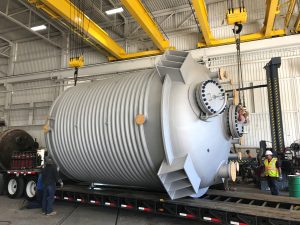 Clad metal, two or more dissimilar metals bonded together, is an important material for many of the world’s essential industries. Metals, including steels, stainless steels, aluminum alloys, copper alloys, nickel alloys and superalloys, titanium, zirconium, and tantalum, often have considerably different properties and when joined can achieve functional benefits unachievable with a single metal. When fabricators understand the value and complexities of fabricating clad, they can offer customers reliable equipment with the desirable characteristics of more expensive metals and the protective and affordable characteristics of others.
Clad metal, two or more dissimilar metals bonded together, is an important material for many of the world’s essential industries. Metals, including steels, stainless steels, aluminum alloys, copper alloys, nickel alloys and superalloys, titanium, zirconium, and tantalum, often have considerably different properties and when joined can achieve functional benefits unachievable with a single metal. When fabricators understand the value and complexities of fabricating clad, they can offer customers reliable equipment with the desirable characteristics of more expensive metals and the protective and affordable characteristics of others.
End-user requirements determine which metals or alloys to use. A common example is providing corrosion- or abrasion-resistant equipment while maintaining the strength and ease of fabrication associated with traditional carbon steels. In this case, designing with clad equipment offers significant heat-transfer benefits compared to equipment fabricated with a solid alloy. This is especially true with jacketed reaction vessels, where the time to reach a reaction temperature is a critical factor in the production of a product.
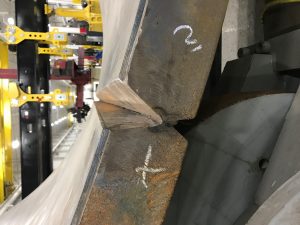
As a trusted fabricator for critical process equipment and vessels for industries of all kinds, Enerfab has extensive experience designing and building to customers’ unique requirements. When clad metals are called for, Enerfab relies on NobelClad.
NobelClad combines metallurgical and welding expertise to join more than 260 compatible and non-compatible metals by the DetaClad™ process, offering the largest collection of clad metal products in the world. The key to Enerfab’s success in fabricating NobelClad’s products is a proprietary process that eliminates the requirement to strip back the cladder from the weld joint while achieving the proper chemistry required for corrosion resistance. The compliant weld in the base metal is performed without the requirement for additional, complex production steps.
Benefits of Clad for Pressure Vessels
The functional benefits of using certified DetaClad™ plates are many. From design flexibility to equipment reliability, end-users ultimately achieve lower operational and maintenance costs.
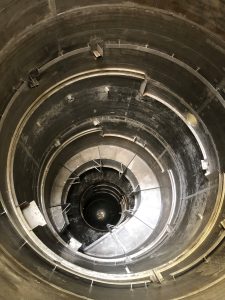 With explosion clad, where metals are bonded using explosives, direct welds are possible without removing the alloy first, saving fabricators time and money. Explosion cladding is particularly useful for manufacturing distillation columns for petroleum products like kerosene, heavy fuel oil, and propane. The trays and other internal features can be welded directly to columns. When selecting a fabricator and clad vendor, quality systems and technical experience are critical. And the welding engineers and technicians at Enerfab have extensive experience in directly attaching components to explosion-clad metals.
With explosion clad, where metals are bonded using explosives, direct welds are possible without removing the alloy first, saving fabricators time and money. Explosion cladding is particularly useful for manufacturing distillation columns for petroleum products like kerosene, heavy fuel oil, and propane. The trays and other internal features can be welded directly to columns. When selecting a fabricator and clad vendor, quality systems and technical experience are critical. And the welding engineers and technicians at Enerfab have extensive experience in directly attaching components to explosion-clad metals.
The high-pressure and high-temperature environments combined with the variety of chemicals in pressure vessels make large clad plates indispensable to fabricators in the oil and gas industry. Pressure vessels for oil and gas are commonly designed as cylinders with hemispherical and/or dished heads. NobelClad’s large plates reduce costs by allowing the manufacture of seamless, one-piece heads, which use an average of 15-to-20 % less material and have fewer welds, making them more reliable and safer than traditional crown and petal applications. Additionally, in some of the most extreme processing environments, end-users rely on reactive metal cladding for corrosion resistance to reduce unplanned downtime and unscheduled maintenance. NobelClad’s large titanium- and zirconium-clad plates offer a more affordable, reliable solution than other alternatives.
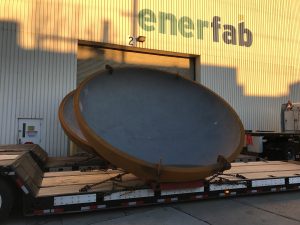 The bond strength produced by the DetaClad™ process is another benefit during the head-forming process. The strength of NobelClad’s explosive bonded clad makes it less likely that the cladder and backer will separate during the dishing and flanging processes associated with forming a head.
The bond strength produced by the DetaClad™ process is another benefit during the head-forming process. The strength of NobelClad’s explosive bonded clad makes it less likely that the cladder and backer will separate during the dishing and flanging processes associated with forming a head.
A History of Successful Projects
For decades, Enerfab and NobelClad have brought value and functionality to many customers. Here’s a sampling of a few such projects, illustrating what two experts in their respective fields can accomplish together.
Clad Vacuum Tower for an Oil Refinery
- 317L-Clad Vacuum Tower
- Enerfab fabricated large knock-down sections in the shop and shipped them to the job site, where the tower was entirely field-erected.
- This large on-site fabrication project required high-bond-strength clad, especially with the internals required for this type of refining project.
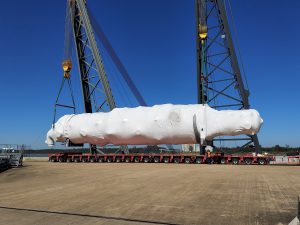
Clad Vacuum Tower for an Oil Refinery
- 317L-Clad Vacuum Towers
- Enerfab fabricated and assembled the tower at our Natchez, Mississippi, shop and shipped it by barge for on-site installation.
- This large-scale project required the high bond strength produced by NobelClad’s process.
Evaporator Vessels for Solution Mining
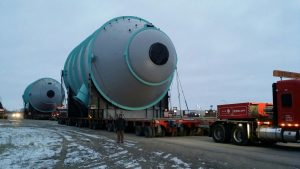 Enerfab and NobelClad both worked with the end-user directly.
Enerfab and NobelClad both worked with the end-user directly.- NobelClad supplied explosion-bonded material to the customer, and Enerfab constructed vessels with customer-owned material, delivering a quality finished product on an accelerated timeline.
Economics of Clad
Best Practices of Designing, Fabricating, and Ordering Clad Seminars
When it comes to designing, fabricating, and ordering clad plates, the nuances and requirements are many. No clad vendor or fabricator is the same, and vetting those options can seem like a daunting task. Enerfab and NobelClad are hosting technical seminars focused on the economics of clad and best practices for designing with clad materials, ordering those materials, and then successfully fabricating the finished product.
By choosing a trusted clad-metals partner and fabricator expert to guide you throughout the design process, you can avoid the pitfalls and protect your investment.
Clad vs. Solid Materials
When we receive an inquiry at Enerfab, we always look to provide the best value for our clients. As a rule of thumb, once the pressure vessel’s calculations show an inch or greater wall thickness, our estimators analyze the use of the clad plate.
Schedule a technical seminar for you and your team >
About Enerfab
Founded in 1901, Enerfab has become an industry-leading contractor for fabrication, construction, and maintenance in the power, chemical, oil & gas, water/wastewater, and heavy industrial markets. At Enerfab, we like to think of ourselves as a complete contractor. One point of contact, managing, and direct hiring almost every craft needed to get the job done.
About NobelClad
A global expert in metal composite solutions, NobelClad is reimagining what is possible to reliably and safely solve complex multi-metal design challenges in the energy, industrial, and infrastructure markets. More than 60 years ago, we introduced explosive metal-forming as an innovative technique to join dissimilar metals. Today, we remain the trusted leader in explosive welding and offer a broader range of customized, dissimilar-metal solutions with added technologies, including weld overlay and roll-bonding solutions.
Want more insight?
Let’s talk about how the benefits of clad materials can help your business. Learn more about how Enerfab can help you by filling out the form below!


